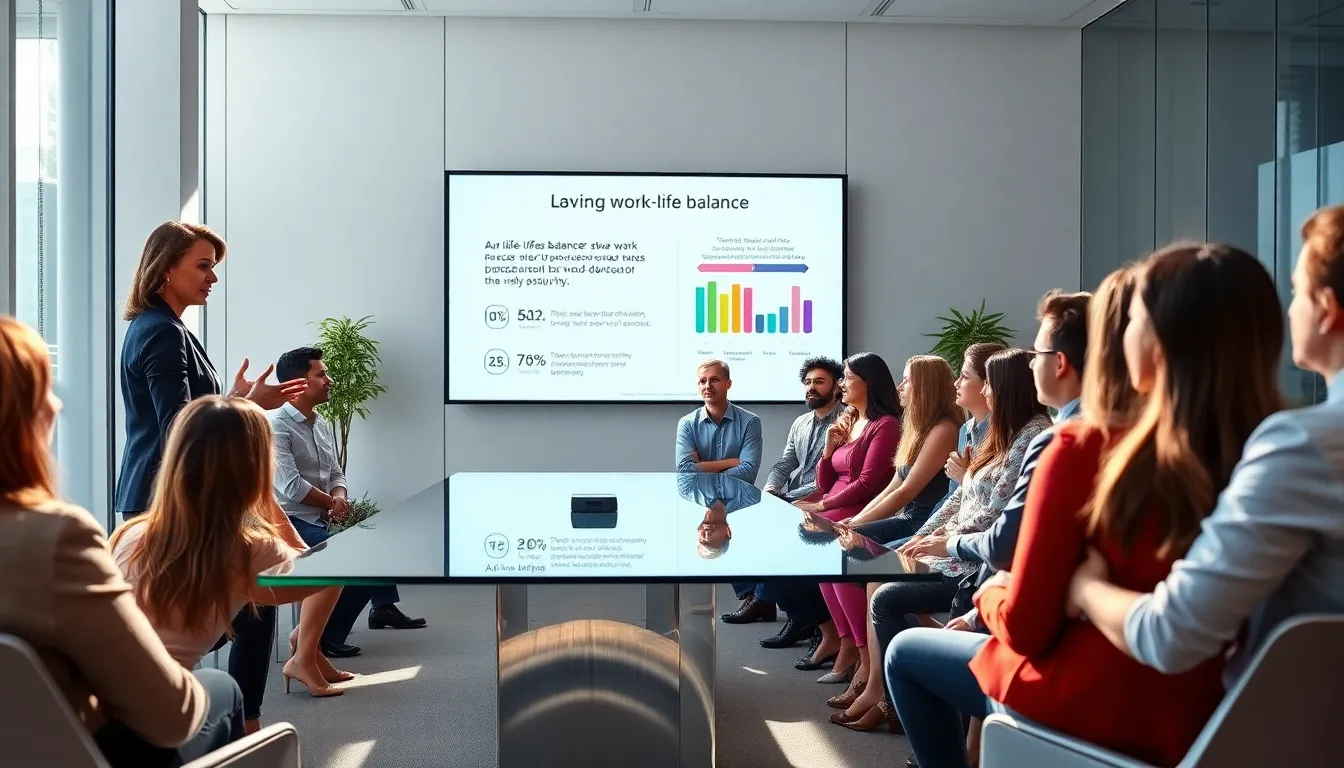In today’s fast-paced world, where emails stretch into the night and work calls darken our weekends, the quest for work-life balance has turned into more than just a buzzword, it’s a mandate for a healthier, happier life. Enter the world of work-life balance speakers, passionate individuals ready to guide the masses away from the brink of burnout. Imagine juggling flaming swords while riding a unicycle, okay, that might be an exaggeration, but you get the picture. These speakers don’t just talk about balance: they embody it, helping people reclaim their lives from the clutches of chaos. If you’re tired of the corporate treadmill and longing for insight, you’re in the right place. Let’s dig deeper into the significance of their message and how their strategies can unfurl a better you.
Table of Contents
ToggleThe Importance Of Work Life Balance

Work life balance is not merely a trend but a fundamental pillar for individual well-being. Studies have shown that a healthy balance can reduce stress levels, improve mental health, and boost overall productivity. When individuals are overworked, it can lead to burnout, affecting both personal and professional lives. In contrast, achieving that balance allows employees to perform optimally, cultivating a healthy workplace environment. It’s simple: happier employees lead to more successful organizations. This topic resonates deeply across various workplaces, making the insight of work life balance speakers essential to driving change. Their expertise helps illuminate the formulation of strategies to manage time, prioritize tasks, and, importantly, reclaim personal boundaries.
What Makes A Great Work Life Balance Speaker?
A great work-life balance speaker combines personal experience with actionable strategies. First and foremost, authenticity reigns supreme. The audience can tell when someone genuinely believes in what they’re preaching. Besides, these speakers often share their own journeys, often chaotic, frequently enlightening. Their relatability draws people in and makes the messages resonate. Beyond storytelling, effective speakers master the art of engagement. This means not just talking at their audience but involving them through interaction, questions, and real-life scenarios. They should also collaborate with organizations to tailor their messages, ensuring that advice is relevant and applicable to specific cultures. Eventually, the best work-life balance speakers empower their audience with tools they can use beyond the event.
Top Work Life Balance Speakers To Consider
There’s a plethora of amazing speakers out there, each bringing a unique spin on the work-life balance concept. Here are a few notable mentions:
- Simon Sinek: He’s known for his insights on leadership and the importance of “why” in both work and life. Although primarily a leadership expert, his emphasis on purpose aligns beautifully with finding balance.
- Arianna Huffington: With her commitment to wellness, she promotes a world where success is redefined, but that starts with personal balance. Her insights are powerful for individuals and organizations alike.
- Brené Brown: Renowned for her research on vulnerability and courage, Brené emphasizes how embracing these traits can lead to a healthier work environment.
- Daniel Pink: Focused on motivation and work trends, he offers strategies that connect productivity to balance.
- Cheryl Sandberg: Her advocacy for women in the workplace includes addressing work-life balance openly, utilizing her own experiences to inspire others.
These speakers don’t just share theories: they provide real, relatable, and applicable methods to seek balance in one’s life.
Techniques And Strategies Offered By Speakers
Work-life balance speakers offer a wide array of techniques and strategies designed to help individuals navigate the tumultuous waters of modern work environments. One common technique is the SMART goals framework. This method encourages individuals to set Specific, Measurable, Achievable, Relevant, and Time-bound goals, eventually aiding clarity in both personal and professional spheres.
Another approach often discussed revolves around the concept of time blocking. By segmenting the day into dedicated time slots for work and personal responsibilities, individuals can create a clearer boundary that prioritizes both tasks effectively.
Mindfulness and meditation also frequently surface in discussions led by these speakers. By cultivating mindfulness practices, individuals can mitigate stress and enhance focus, two crucial elements for maintaining balance. Also, promoting the practice of saying “no” is vital. Overcommitting can lead to the very burnout they’re striving to avoid.
Finally, many speakers emphasize the importance of self-care routines. Whether it’s exercise, hobbies, or just family time, carving out personal time is essential to maintain a balanced life.
How To Choose The Right Speaker For Your Event
Selecting the right speaker for your event is no small feat. Begin by identifying your audience’s primary needs and priorities. Do they lean more towards mental health strategies, productivity hacks, or leadership skills? Once clarity is established, sift through potential speakers based on their expertise in those areas. Each speaker brings a unique angle on work-life balance, impacting different demographics distinctively.
Don’t forget to examine their previous talks. Many speakers offer video snippets or testimonials from former engagements, which can gauge both presentation style and audience engagement. It’s also advantageous to assess their relevance to your organization’s culture. The most potent speakers will align their messages with your organization’s values.
Finally, consider the level of interactivity you want for your event. Do you fancy a more traditional lecture style or a dynamic workshop? Engaging speakers can adjust their style to fit the desired atmosphere, eventually enriching the attendee experience.
Incorporating Speaker Insights Into Your Organization
Integrating insights from work-life balance speakers into an organization requires a thoughtful approach. Start with workshops or training sessions post-event to ensure that the concepts resonate deeper. Leaders can summarize key points and brainstorm actionable steps that participants can adopt in their daily routines. Establishing an accountability system allows individuals or teams to commit to new practices, enhancing the likelihood of sustainable change.
Create a supportive environment where questions, discussions, and feedback about the newly implemented strategies are encouraged. This helps reinforce concepts learned from the speakers, fostering a culture of balance. Besides, incorporating regular check-ins or follow-up sessions ensures that these systems evolve and cater to the ongoing needs of employees.

